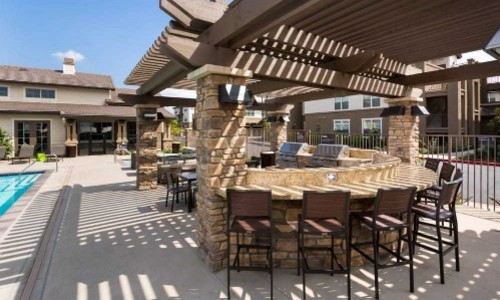6 minute read
|
Cooking Tools
You've got a freezer full of premium grass-fed Kobe beef, and now it's time to decide—should you opt for an aluminum or stainless steel natural gas grill? Ultimately, the choice boils down to personal preference. If you're deep into grill research, you already know that both aluminum and stainless steel offer fantastic options for your outdoor cooking needs. Both materials look great and suit a variety of styles and preferences. They are also resistant to corrosion, ensuring that your grill will maintain its appeal over time. However, before diving into the pros and cons of each material, let's clarify what we mean when we refer to "aluminum" or "stainless steel" grills. When we say a grill is made of aluminum or stainless steel, we're specifically referring to the outer shell of the main cooking portion of the grill—the lid and basin. Importantly, regardless of whether the grill is labeled as aluminum or stainless steel, key components such as the grates, burners, and other critical parts are always made from stainless steel. This is because these surfaces come into direct contact with food, and using stainless steel ensures safety and hygiene. The primary differences between aluminum and stainless steel grills lie in their appearance, weight, and price point. Aluminum grills typically have a matte black finish, while stainless steel models boast a sleek, shiny metallic look. Your choice depends on the aesthetic you prefer and how it complements your outdoor space. Both options will enhance your grilling experience and make your meals delicious. For those planning to install a built-in barbecue grill that won't move frequently, either material works excellently and withstands the elements. If you cannot store your grill during winter due to its fixed installation, consider purchasing a weatherproof cover and a sturdy enclosure for protection. Regardless of the material, regular maintenance will ensure your grill lasts for years to come. Stainless steel grills tend to be pricier because they are more challenging to work with. They require intense heat treatment and are harder to mold as they cool. However, stainless steel is more durable and resistant to impact compared to aluminum, which is easier to repair. While both materials are corrosion-resistant, stainless steel holds up better in damp conditions. Still, proper care will keep your grill in excellent condition, no matter the material. As noted earlier, both types of grills come equipped with stainless steel components like grates and burners. This decision prioritizes safety and cleanliness, as these surfaces often touch food. Additionally, stainless steel adds a touch of elegance to your grill setup. Both aluminum and stainless steel grills come in a variety of sizes and mounting options. Whether you prefer a portable propane grill on wheels, a permanent pedestal model, or an integrated countertop unit, there's a grill for every lifestyle. Furthermore, these grills usually come loaded with popular features such as a 60-minute gas shutoff timer, drawers, shelves, storage compartments, warming racks, and user-friendly match-free ignition systems. The shutoff timer is particularly useful for public spaces like apartment complexes, enhancing safety and convenience. Other standard features include theft-resistant knobs and laser-etched instruction plates that remain clear and readable over time. These details add value, especially in shared outdoor areas, and make grilling easier for everyone involved. Each type of grill offers flexibility in size and configuration. Before making a purchase, carefully measure your intended installation area to ensure a seamless fit. This step is crucial for optimizing your outdoor cooking space. Although both aluminum and stainless steel grills are highly corrosion-resistant and built to last, regular upkeep is essential to maximize their lifespan. Give your grill a thorough cleaning before and after each grilling season, as well as after removing it from storage. Inspect all connections and hoses for signs of pinching or scratching. Every time you retrieve your grill from storage, double-check for insect infestations, dirt, blockages, or physical damage. For more detailed advice, consult our guides on grill maintenance and safety. Rest assured, at AEI, we provide all the necessary parts and supplies to keep your grill in top condition. Our designs focus on ease of part replacement and repair. Virtually any component can be swapped out following straightforward instructions found in your grill's owner manual. Summer may just be starting, but winter will arrive faster than expected. Extend your grilling season with a natural gas or propane patio heater from AEI. When the weather cools down, you'll still want to enjoy your favorite grilled dishes for fall holidays. Our infrared heaters are powerful, efficient, and safe, available in various sizes and mounting options similar to our grills. With an AEI grill and heater combo, you'll become the star of your neighborhood's culinary scene! Need more information? Have questions? Contact us today, and we'll be glad to assist you! Air To Water Heat Pump,Commercial Heat Pump,Residential Heat Pump,Monobloc Air To Water Heat Pump FOSHAN UWOTEC NEW ENERGY CO., LTD. , https://www.uwo-heatpump.comWhich is Better for Your Grill: Aluminum or Stainless Steel?

Understanding Aluminum & Stainless Steel Grills
Shared Features of Aluminum & Stainless Steel Grills
Maintenance Tips
Preparing for the Cooler Months
Air to water heat pumps, which absorb heat from the outside air and then transfer it via the central heating system to provide hot water heating, radiator, or underfloor heating in an indoor space. UWO air to water heat pumps can be used for both heating and hot water systems, making them a versatile solution for building energy needs. Additionally, they have a long lifespan and require minimal maintenance, making them a reliable and low-maintenance option for heating and hot water systems.